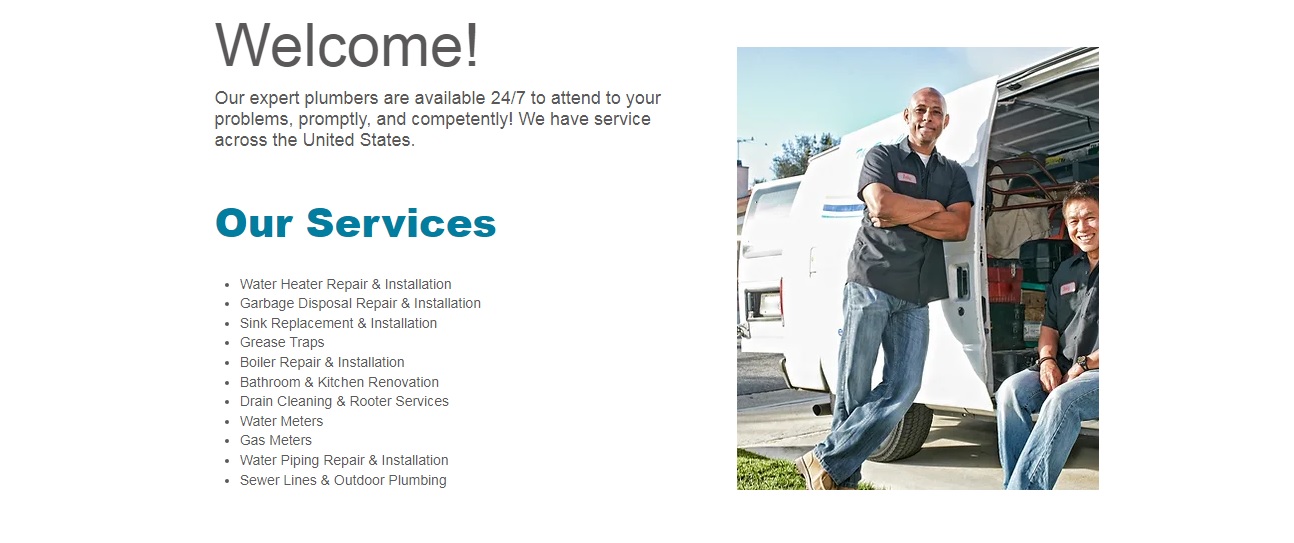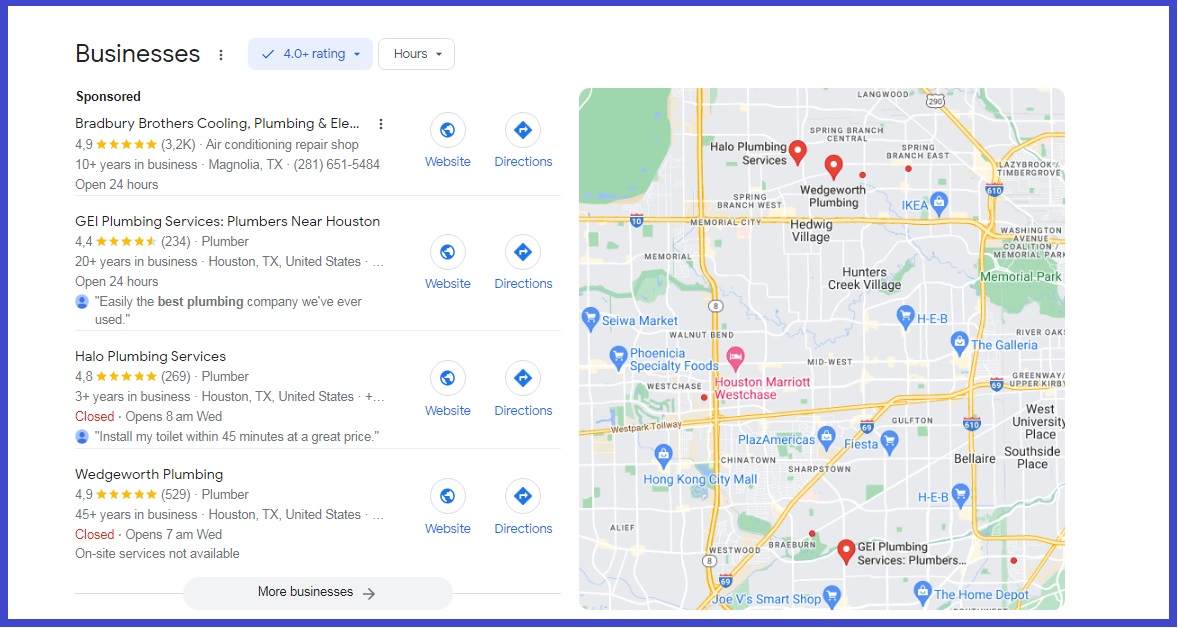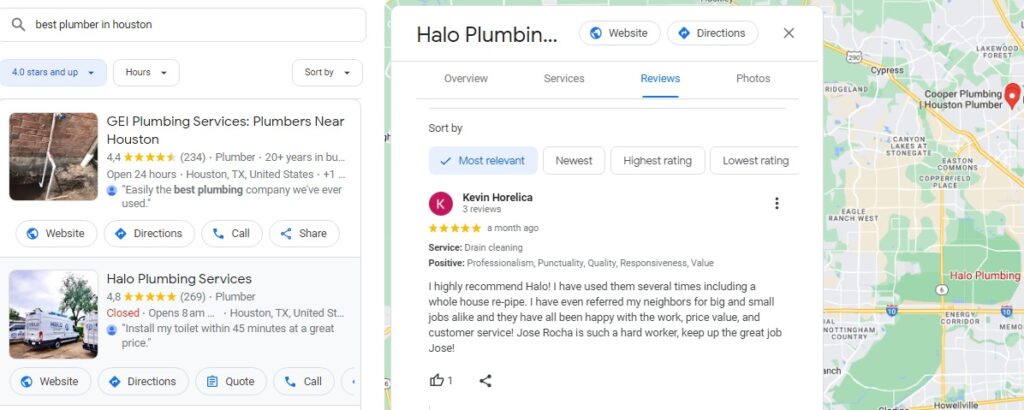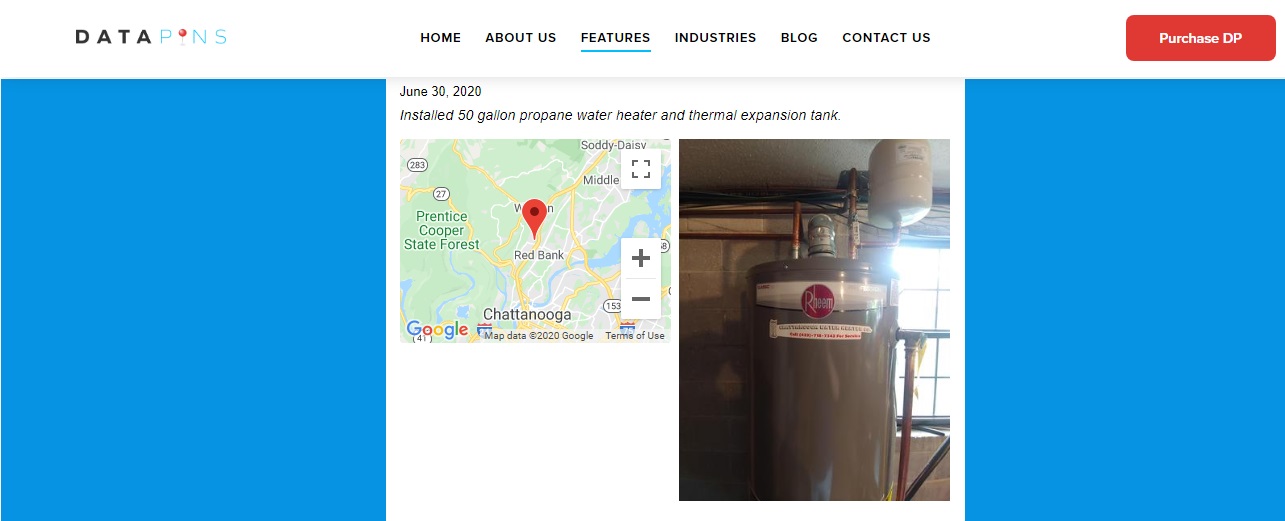Plumbing SEO: 15 Winning Strategies to Attract Customers

When you buy something through one of the links on our site, we may earn an affiliate commission.
Plumbing SEO is the lifeblood of any modern plumbing business seeking online visibility and local customer engagement. In an era where most customers turn to search engines for answers, the importance of SEO for plumbing professionals cannot be overstated.
This guide delves into the best practices to make your plumbing business stand out in search results. These tactics will ensure that your company is the first call when a faucet leaks or a drain clogs.
Dive in and discover how to elevate your online presence and attract a steady stream of clients through an effective SEO plan.
Contents
Implement SEO Basics for Your Plumbing Business
Implement SEO basics and watch your plumbing website flow to the top of organic search results!

SEO for Plumbers: Keyword Research
Dive deep into keyword research, and watch your plumbing business flow to the top!
1. Target Keywords for Plumber SEO
Potential clients use specific words or phrases when searching for services they need.
As a plumbing company, focus on relevant plumbing keywords reflecting your services and the regions you service.
Compile a list of relevant plumbing-related keywords with high search frequency yet low competition. Read this article that explains how to find low-competition keywords.
2. Check For Popularity
You'll likely need a page for each service you provide. However, it’s wise to focus on the services people search for frequently first.
You should have a list of keywords you would like to target by now.
Use Semrush keyword research tools to examine "near me" searches for your plumbing services. Read our Semrush review and tutorial to earn more. You may also be interested in the Semrush Keyword Magic Tool.
Those keywords might be:
- Drain cleaning services 'near me'
- Boiler repair 'near me'
- Boiler installation 'near me'
Check the volume of searches and target the high-volume searches first.

3. Assign Keywords to Pages
Make sure you include primary and long-tail keywords in the content pages.
Once you've identified the relevant keywords, it's essential to use them on your website. Ensure they're integrated into specific sections of your site.
Search engine bots usually examine areas like these to understand the topic of a webpage:
- Meta descriptions
- Title tags
- Headers
- Main content
Plumber SEO: Create Content
Just as pipes direct water, captivating content directs customers to your plumbing services!
4. Create a Location Page
A location page for local SEO is a dedicated webpage on your business site aimed at a specific geographic area.
It is particularly good for businesses with multiple locations.
The location page helps you rank better on Google, especially when users search with local keywords like "Plumber near me."
If you serve a single area, integrate the location into the Home, Service, and Contact pages.
The location page typically contains information tailored to that specific area, such as:
- Address of the Business. The business's exact location in that specific city or area.
- Local Phone Number. A contact number that is local to that area.
- Operating Hours. This is helpful if different branches have varied operating hours.
- Specific Services Offered. Sometimes, the services you offer are not applicable to all locations.
- Reviews or Testimonials. As a local plumber, you need reviews or testimonials from each customer in the locations where you operate.
- Local Landmarks or Directions. This helps people to find the business, mainly if it's located near well-known landmarks.
- Photos: Include images of that specific branch, its staff, or prominent projects completed in the area.
- Local Events or Sponsorships: Mention it if your business is involved in any local community events or sponsorships in a particular area.
- Localized Content: Provide information or content pieces that might be relevant to your potential customer in that specific location.
5. Write Plumbing Service Pages

A service page for local SEO is a specific webpage on your business website that details a particular service or set of services that your business offers, with content tailored for local audiences.
The primary goals of such a page include:
- Informing Visitors. It provides detailed information about a specific service, helping potential customers understand what the business offers and how it can meet their needs.
- Local Optimization. By incorporating local keywords, geographic references, and locally relevant content, the service page aims to rank higher in search engine results when potential customers search for that service in the business's locale. For instance, a plumber in Austin might have a service page titled "Pipe Repair Services in Austin" to attract local queries.
- Conversions: A well-designed service page will have clear calls-to-action (CTAs) encouraging visitors to make an appointment, request a quote, or directly purchase a service.
- Building Credibility. These pages often include proof of expertise, like case studies, testimonials, or certifications relevant to the service. They establish trust and credibility with potential customers.
A service page for local SEO is a strategic combination of service details, local optimization, and conversion elements to drive local business and establish a solid online footprint in a particular local area.
6. Build Blog Pages
Craft valuable content for your website using identified keywords. Focus mainly on landing pages and blogs. Prioritize your content marketing efforts to establish yourself as a trusted expert.
To produce engaging content:
- Address your audience's challenges.
- Use persuasive writing to highlight your service benefits.
- Craft compelling headings and detailed content for your plumbing business.
- Share insights about your business's journey and values.
Speed up your SEO efforts by studying competitors. Search for your target keywords on Google and review the top Google results to understand their keyword usage in content, titles, and meta descriptions.
By examining their SEO techniques, you can craft a strategy to surpass them. When analyzing competitors:
- Recognize your leading competitors in the plumbing industry
- Check keyword competitiveness
- Identify content areas they might have missed
- Review their overall SEO strengths
- Examine their backlinks
- Look into their site structure and user experience
- Assess their social media engagement
7. Optimize for On-page SEO
Plumbing company success starts with on-page SEO, ensuring you're the first call for leaks and clogs!
- Keyword Research. Again, it's super important to identify keywords that your potential customers might be searching for.
- Page Titles. Ensure every page has a unique and descriptive title with the target keyword.
- Meta Descriptions. Write compelling meta descriptions for each page, encouraging click-throughs from search results.
- Header Tags. Organize content using H1, H2, and H3 tags. Include keywords in the headers.
- Image Optimization. Use relevant image file name alt tags and compress images for faster loading.
- Content Quality. Make sure the quality of your content is of the highest standard.
- Keyword Density. Ensure keywords are used naturally within the content without keyword stuffing.
- Internal Linking. Link to other pages within your website using relevant anchor text. Use an automated tool like Link Whisper - it's a big time saver.
- Social Sharing Buttons. Enable social sharing to enhance visibility.
- Optimized Call-to-Actions. Guide visitors on the desired actions you want them to take.
- Multimedia Elements. Use videos, infographics, and other media to enhance user engagement. But make sure these do not affect the page load time.
8. Improve Technical SEO
Technical SEO ensures your plumbing website doesn't have leaky digital pipes!
- Website Speed. Ensure pages load quickly across all devices.
- Mobile Responsiveness. Verify that your site passes the Google Mobile-Friendly Test.
- XML Sitemap. Create, optimize, and submit a sitemap to search engines.
- Robots.txt. Use it to guide search engine bots about which pages to crawl.
- HTTPS. Secure your website with an SSL certificate.
- Site Structure. Organize content hierarchically and logically for users and search engine crawlers.
- URL Structure. Use short, descriptive, clean URLs that reflect site hierarchy. Include primary keywords in the URL.
- Structured Data. Structured data is a coding language that helps search engines recognize, process, and present the content from your website. Use structured data to ensure that search engines understand your site's content.
- Redirects. Properly set up 301 redirects for deleted pages and avoid many redirects.
- Broken Links. Regularly check for and fix 404 errors or broken links.
- Site Depth. Ensure important pages are easily accessed from the homepage.
- Server Performance. Use a reliable hosting provider and consider server response times.
- Breadcrumb Navigation. Use breadcrumb navigation to help viewers and search engines understand the site structure.
- Core Web Vitals. Monitor and optimize for key user experience metrics like Largest Contentful Paint (LCP), First Input Delay (FID), and Cumulative Layout Shift (CLS).
9. Build Links
In the world of digital marketing, building links is the key to topping the search result flow!
Having strong backlinks can help your plumbing website rank better. It's all about getting links from good websites. Better links mean higher search engine rankings.
Building links takes effort. If you want better search results for your site, think about hiring an SEO company specializing in link building.
Start building links:
- Write for other blogs and get a link back.
- Use the HARO service for links.
- Look at what links your competitors have.
- Reclaim any links you may have lost.
Plumbing SEO: Optimize for Local SEO Services
Plumber SEO services with a local SEO twist are the secret recipe to being the town's favorite fixer!

According to a survey by BrightLocal, the top local SEO ranking factors are:
- Google Business Profile
- On-page SEO
- Reviews
- Links
- Behavioral signals
- Citations
As you can see, these factors need to form part of your search engine optimization strategy.
10. Optimize Your Google Business Profile
A Google Business Profile is a local SEO strategy to drive potential local customers to your business.
Google Business Profile, formerly Google My Business, offers a free online business listing on Google Search and Google Map results.
It showcases:
- Contact information
- Operational hours
- Reviews
- Photos

To claim the profile, search for your business on the Google Business Profile Manager and follow the instructions.
Completing your profile involves:
- Selecting a business category
- Defining your service area
- Providing contact details
- Adding relevant business information
Once set up, your business will be visible on Google Maps and Search when customers look for local services in your vicinity.
To find out more, read our article on how to optimize your Google Maps listing.
Additionally, claim your free Bing Places for Business listing for visibility on Bing platforms.

11. Build Citations
A citation refers to your business being mentioned on another website or an online directory. It includes your business name, address, and phone number.
Citations boost your business's local SEO campaign, helping you reach more potential customers. Creating citations also enhances trust and credibility with local consumers.
Although their significance has slightly diminished over time, maintaining consistent and accurate information across the web remains important for gaining consumer trust.
12. Collect Reviews
According to the survey mentioned above, 16% of SEO experts believe that reviews are an important factor influencing Google Map Pack rankings.
Encourage your customers to leave positive reviews on platforms like your Google Business Profile and Yelp. This will boost your local search rankings.
Including reviews and testimonials on your website can enhance user trust and engagement. Using relevant keywords and location details in these reviews can further improve your SEO strategy.
Positive online reviews are key for any off-page SEO campaign. They enhance your online reputation and attract potential customers.

13. Gather Social Proof
Engaging with customers on social platforms may be a low priority for many in the trade, but platforms such as Facebook can benefit plumbing companies. Clients often turn to these sources for updates, operational timings, and customer reviews.
Establish a social media presence on platforms like Facebook and LinkedIn tailored for your plumbing business. Ensure you upload sharp images and provide clear Name, Address, and Phone (NAP) details for straightforward communication.
Let your satisfied customers do the talking!
Their testimonials will boost your digital marketing and build trust with potential clients!
14. Rank on Google Maps with DataPins
Consider using DataPins to support your SEO effort in getting more plumbing leads.

What is DataPins?
DataPins is a software tailored to enhance your local SEO effort. It allows you to automatically publish content based on completed jobs, improving your online reputation.
For instance, after a sewer job in Houston, TX, the related content is added to the website's Houston and Sewer page. The software also features a map ranking app for pinpointing job sites, aiding in content localization.
By producing consistent, localized content, DataPins boosts a business's presence on platforms like Google Maps and Google Search. It simplifies the task of maintaining relevant, localized content on your website.
15. Get Listed in Directories
Ensure your plumbing business is listed in local online directories to boost local search visibility.
Directory submissions are crucial for:
- Accurate business information
- Enhancing backlinks
- Strengthening off-site search engine optimization strategies.
Well-known online plumbing directories and listings include:
- Angi (formerly Angie’s List)
- Yelp
- HomeAdvisor
- Porch
- Thumbtack
- LocalPages
- Bing
- Yahoo Local
- Yellow Pages

BrightLocal actually provides a number of tools to get you better SEO results.
With these, you can:
- Trace Local Rankings
- Audit Local SEO
- Manage Reputation
- Manage Listings
Try BrightLocal out here for free for 14 days!
Plumbing SEO: Conclusion
In the vast pipeline of the digital realm, optimizing your plumbing business for search engines is non-negotiable.
From understanding the intricacies of on-page SEO to diving deep into keyword research, from localizing content to building sturdy backlinks, the path to SEO success for a plumbing enterprise is multifaceted.
However, the rewards—increased visibility, an influx of local clientele, and establishing authority in the plumbing domain—make the journey worthwhile.
By embracing the strategies we discussed and continually updating them in line with evolving SEO trends, plumbers can ensure that their services remain a local essential and a prominent online fixture.
There's no better time for plumbing businesses to flow seamlessly into the SEO stream and stay ahead of the competition.
Want to learn step-by-step how I built my Niche Site Empire up to a full-time income?
Yes! I Love to Learn
Learn How I Built My Niche Site Empire to a Full-time Income
- How to Pick the Right Keywords at the START, and avoid the losers
- How to Scale and Outsource 90% of the Work, Allowing Your Empire to GROW Without You
- How to Build a Site That Gets REAL TRAFFIC FROM GOOGLE (every. single. day.)
- Subscribe to the Niche Pursuits Newsletter delivered with value 3X per week
My top recommendations
















